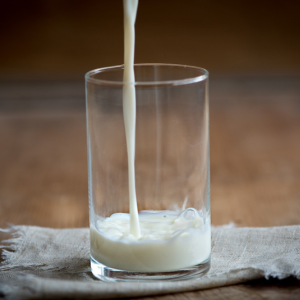
One of the pillars of the Flo Living lifestyle is eliminating dairy. The truth is that dairy is bad for our hormones - it is a root cause of PMS, PCOS, acne, endometriosis, and infertility issues. We don’t need it and we can get all of the nutrients - including calcium - perfectly well from other foods. Getting rid of dairy will only have a positive impact on your overall health. Trust me!

My dairy-free journey
I have been dairy free for 17 years and being strict about this was absolutely essential for me to reverse my PCOS symptoms, clear my skin, and get pregnant with my daughter. I’ve never missed or craved dairy ever, but interestingly enough when I was pregnant, my body told me that I needed to introduce some dairy back into my diet. I always listen to my body, and so I very carefully experimented with adding in some dairy.
I have to be honest, I was pretty scared to try adding this back in given how severe my reaction used to be to dairy - my skin would break out in hives and my stomach would be miserable for days. I knew that the only healthy way I could do this, however, was to choose plain goat milk-based yogurt. So, three times a week I would eat a little bit of that goat yogurt and my body thanked me for it - not one negative symptom.
Now however, as I continue with this protocol while I am breast-feeding, I’m finding that I’m starting to show clear signs of my body’s sensitivity to dairy once again - the congestion, the running nose, the sneezing. This has showed me that although I am able to use dairy medicinally short-term, soon it will be time for me to stop and go dairy-free again. And I won’t be giving cow dairy to my daughter - why set her up for hormonal chaos if I don’t have to? She’ll get goat-milk kefir which also packs a probiotic punch when the time comes.
The dangers of dairy
The moral of my story is: if you feel the need to have dairy - always go with goat! The majority of dairy cows in the US are injected with a genetically modified growth hormone that causes them to produce more milk than they would naturally. So when you eat or drink this milk, you too are consuming the artificial hormones. The majority of cows are also treated with antibiotics, which your body will then absorb. Plus, they’re fed GMO corn or soy. All three parts of this process combine in your body to wreck your hormonal ecosystem.
4 ways dairy is hurting your hormones:
- Dairy creates inflammation in the intestinal tract which can hinder your fertility.
- Dairy can throw off your body’s own estrogen production by introducing artificial growth hormones.
- Dairy containing antibiotics will negatively impact your microbiome, thereby preventing estrogen metabolism.
- Dairy depletes your magnesium stores, which throws off your pituitary gland and the rest of the adrenal glands.
The calcium paradox
I suggest you pick up a copy of Annemarie Colbin’s, Food and our Bones: The Natural Way To Prevent Osteoporosis - her work completely undermines the mythology around dairy which we’ve all grown up with. Rather than helping us to form strong bones, dairy actually leaches calcium out of our bones, making us more susceptible to osteoporosis. Cobin does not recommend calcium supplements or pills, but instead a diet rich in vegetables, fruits and greens. Cobin discovered it was those women living in dairy-dominant cultures such as the US and northern Europe that actually had the highest incidences of osteoporosis, as well as heart disease and breast cancer.
We’ve long been told milk is keeping us healthy and strong, when it’s actually doing the opposite. Studies also show that taking calcium supplements will not save us from bone fractures in our old age. In fact, too much calcium supplementation in pill form can lead to kidney stones and, potentially, a higher risk of heart disease.
The 10 best (and surprising!) sources of calcium
If you’ve been relying on dairy, then you’ve not been getting enough calcium. Here are foods to fill your plate with that are packed with calcium and other beneficial nutrient combinations.
- Sardines (with the bones) - Click here for my personal recipe!
- Dried figs
- Bok choy
- Kale
- Almonds
- Oranges
- Sesame seeds
- Oatmeal
- Seaweed
- Collard greens
Tips to help eliminate dairy
Hopefully all of this information has helped you decide to go dairy-free! If you’ve been eating a dairy rich diet for some time, there are 3 steps you can take to speed up the elimination process and get your hormones back on track.
Step 1 - Do my 4-Day Hormone Detox - it’s free!
Step 2 - Add 2 tsp of organic flax meal daily - to scrape out (gently) all that casein that has been accumulating in your intestinal tract and causing inflammation.
Step 3 - Use warming spices like cinnamon, turmeric and cayenne pepper daily - to dry out the mucus that dairy produces in the body.





